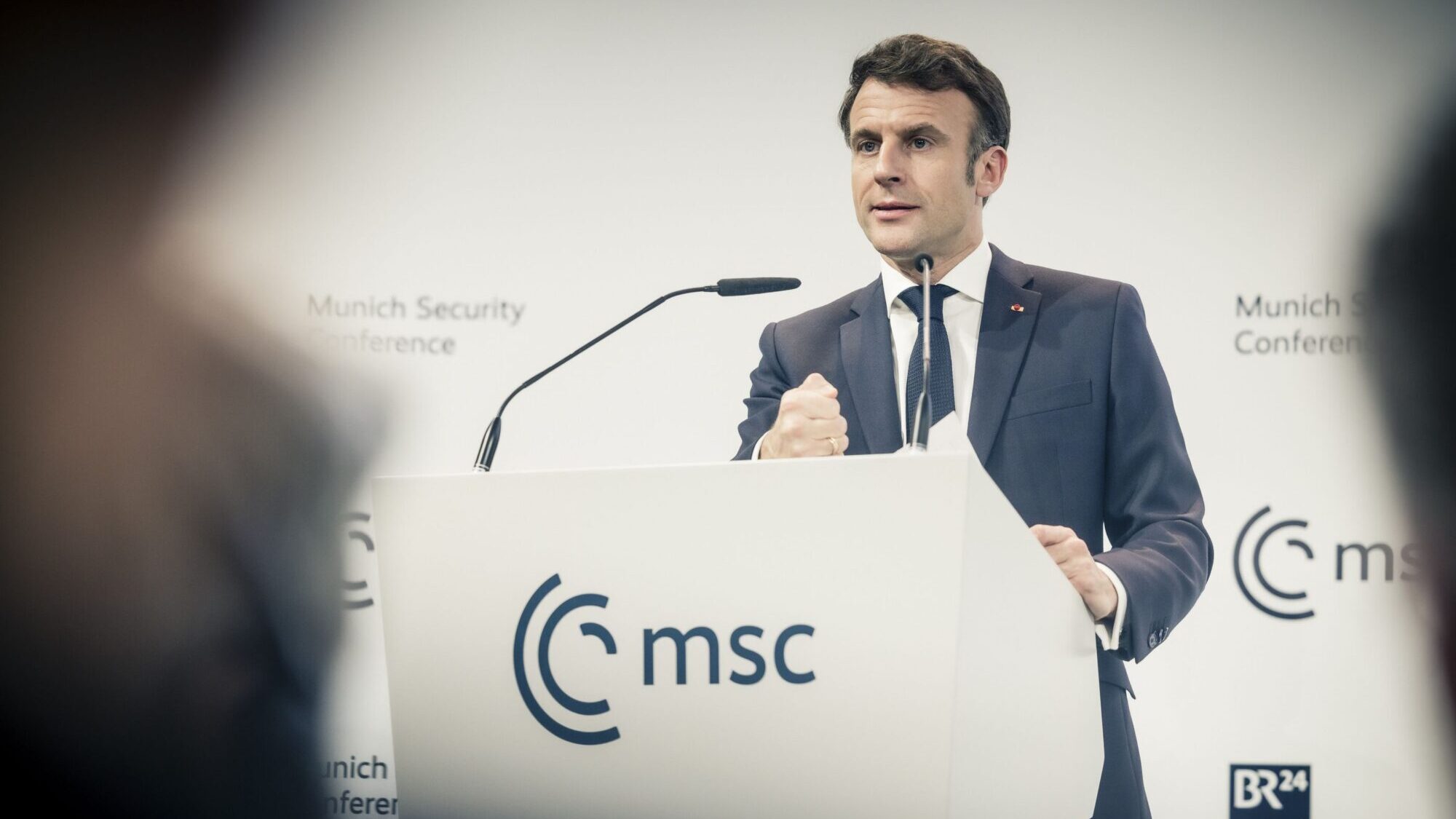
Emmanuel Macron
Photo: Munich Security Conference 2023
As this year’s Munich International Security Conference kicked off, French President Emmanuel Macron and German Chancellor Olaf Scholz found themselves on the same page. For as long as the war continues, their support of Ukraine remains unwavering.
One year after Russia’s invasion, Western allies are gathering in Munich for a series of high-level talks focused primarily on the war in Ukraine.
Whereas before, France was viewed by allies as too eager to seek compromise with Moscow, in his Friday address, Macron adopted a firmer tone. “This is not the appropriate time for dialogue [with the Kremlin],” the French president stressed, adding that Russia’s invasion “had to fail.”
He called on NATO allies to increase military support to Ukraine to bolster its efforts in launching a counteroffensive. “It is Moscow that has made the choice to start a war,” he said. “It is now stepping up the fight, committing war crimes and attacking civilian infrastructure.”
Pointing to a lack of proper investment in defense—a sore point among many NATO member states—Macron called on European countries to do more in this area. Joint investment in European arms production is also needed, Macron added. “If Europe wants to defend Europe, it must arm itself,” he said.
Air defense in particular needs attention so that peace on the European continent remains enforceable, he noted. A future Paris conference, which would focus on joint European air defense, would serve that aim.
As for Ukraine, Macron stressed that
we absolutely need to intensify our support and our effort to the resistance of the Ukrainian people and its army and help them to launch a counter-offensive which alone can allow credible negotiations, determined by Ukraine, its authorities, and its people.
Earlier in the day, German Chancellor Olaf Scholz remarked that it was wise to be prepared for a prolonged war in Ukraine. In that scenario, Scholz said his country acknowledged “its responsibility for the security of Europe and the NATO alliance area, without ifs and buts.” This is, he added, “a responsibility that a country of Germany’s size, location, and economic strength has to shoulder in times like these.”
To meet that pledge, Germany would switch to “a permanent production of the most important weapons we are using,” the chancellor added.
While stressing the importance of continued support for Ukraine, he did not speculate on when or how the conflict might end. According to Scholz, a majority of the German population supports that position.
A recent survey, as reported by The European Conservative, however, showed that nearly half of the survey respondents (47%) reported feeling personally threatened by Germany’s participation in the war through its military support.
Scholz did not neglect to upbraid Germany’s partners for their dithering in sending tanks to Kyiv after Berlin, having overcome its initial hesitance, committed to supplying its own Leopard 2’s.
The two European leaders’ statements followed a video address by Ukrainian President Volodymyr Zelensky. Addressing the security conference, he said that it was “obvious” that Russian President Vladimir Putin was keen on incorporating other former Soviet countries into the Russian Federation.
Drawing on analogy, he said that “determination is never abstract,” as “David defeated Goliath not by the power of conversation, but by the power of his actions.” In the Biblical tale, David, but a slender boy, beat the giant Goliath, armed with only a sling.
“Delay has always been and still is a mistake,” Zelensky added, saying that “Goliath must lose” for the world to be safe.
In this tale of an underequipped hero outwitting a fierce enemy, Zelensky wants more and better arms. While he showed himself grateful for the aid received thus far, delaying it has always been detrimental, Zelensky complained.
The international conference on security issues and international relations has been held at the Hotel Bayerischer Hof in the Bavarian capital for 60 years. Last year’s conference ended a few days before the Russian invasion on February 24th, 2022.
Significantly, in 2008, the conference played host to a famous and, after Russia’s 2022 invasion, much-revisited speech by Russian President Vladimir Putin.
NATO expansion, he remarked,
does not have any relation with the modernisation of the Alliance itself or with ensuring security in Europe. On the contrary, it represents a serious provocation that reduces the level of mutual trust. And we have the right to ask: against whom is this expansion intended?
At this year’s conference, which runs from February 17th-19th, Russia, for obvious reasons, had not been invited.
